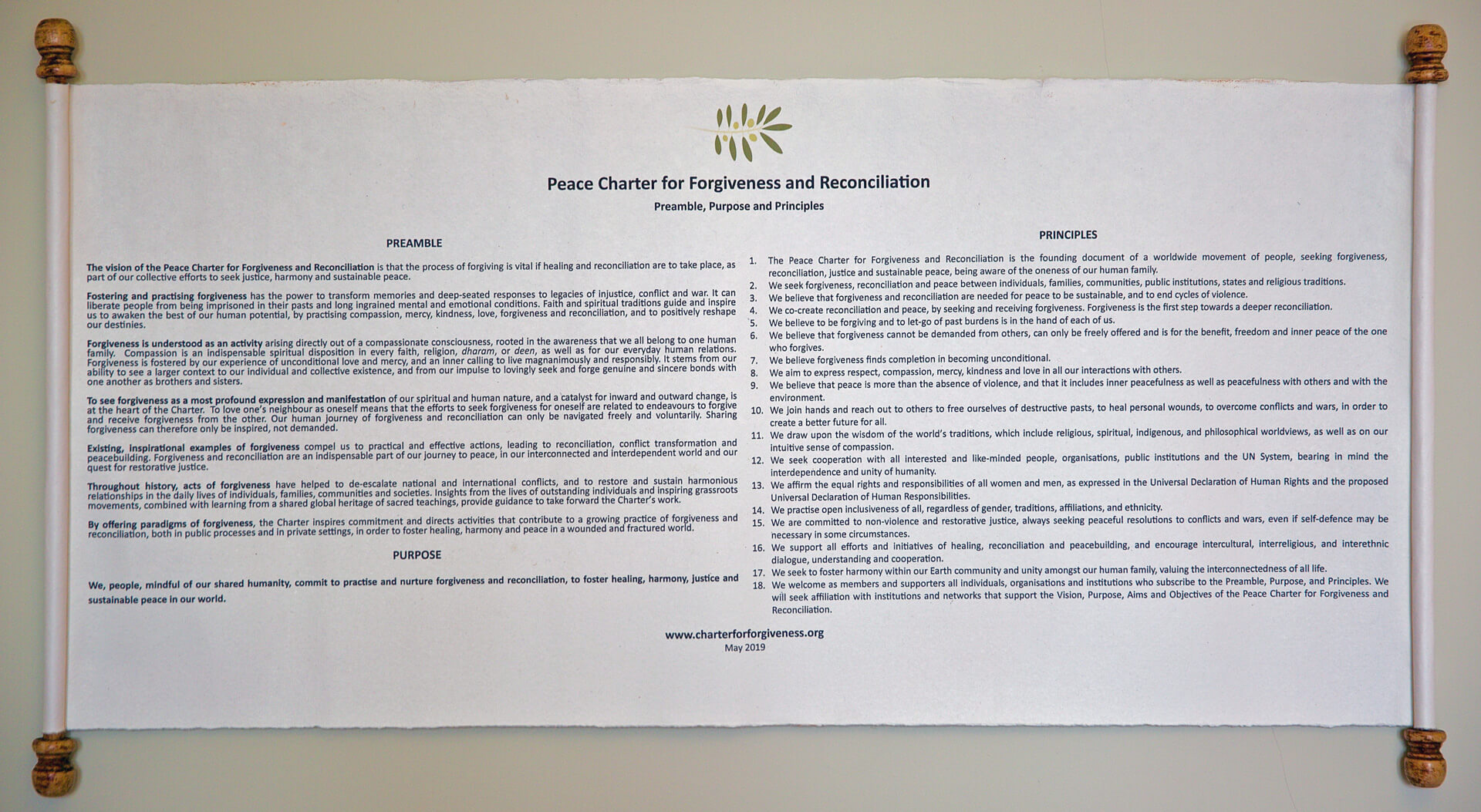charter

PREAMBLE
The vision of the Peace Charter for Forgiveness and Reconciliation is that the process of forgiving is vital if healing and reconciliation are to take place, as part of our collective efforts to seek justice, harmony and sustainable peace.
Fostering and practising forgiveness has the power to transform memories and deep-seated responses to legacies of injustice, conflict and war. It can liberate people from being imprisoned in their pasts and long ingrained mental and emotional conditions. Faith and spiritual traditions guide and inspire us to awaken the best of our human potential, by practising compassion, mercy, kindness, love, forgiveness and reconciliation, and to positively reshape our destinies.
Forgiveness is understood as an activity arising directly out of a compassionate consciousness, rooted in the awareness that we all belong to one human family. Compassion is an indispensable spiritual disposition in every faith, religion, dharam, or deen, as well as for our everyday human relations. Forgiveness is fostered by our experience of unconditional love and mercy, and an inner calling to live magnanimously and responsibly. It stems from our ability to see a larger context to our individual and collective existence, and from our impulse to lovingly seek and forge genuine and sincere bonds with one another as brothers and sisters.
To see forgiveness as a most profound expression and manifestation of our spiritual and human nature, and a catalyst for inward and outward change, is at the heart of the Charter. To love one’s neighbour as oneself means that the efforts to seek forgiveness for oneself are related to endeavours to forgive and receive forgiveness from the other. Our human journey of forgiveness and reconciliation can only be navigated freely and voluntarily. Sharing forgiveness can therefore only be inspired, not demanded.
Existing, inspirational examples of forgiveness compel us to practical and effective actions, leading to reconciliation, conflict transformation and peacebuilding. Forgiveness and reconciliation are an indispensable part of our journey to peace, in our interconnected and interdependent world and our quest for restorative justice.
Throughout history, acts of forgiveness have helped to de-escalate national and international conflicts, and to restore and sustain harmonious relationships in the daily lives of individuals, families, communities and societies. Insights from the lives of outstanding individuals and inspiring grassroots movements, combined with learning from a shared global heritage of sacred teachings, provide guidance to take forward the Charter’s work.
By offering paradigms of forgiveness, the Charter inspires commitment and directs activities that contribute to a growing practice of forgiveness and reconciliation, both in public processes and in private settings, in order to foster healing, harmony and peace in a wounded and fractured world.

PURPOSE
We, people, mindful of our shared humanity, commit to practise and nurture forgiveness and reconciliation, to foster healing, harmony, justice and sustainable peace in our world.

PRINCIPLES
1. The Peace Charter for Forgiveness and Reconciliation is the founding document of a worldwide movement of people, seeking forgiveness, reconciliation, justice and sustainable peace, being aware of the oneness of our human family.
2. We seek forgiveness, reconciliation and peace between individuals, families, communities, public institutions, states and religious traditions.
3. We believe that forgiveness and reconciliation are needed for peace to be sustainable, and to end cycles of violence.
4. We co-create reconciliation and peace, by seeking and receiving forgiveness. Forgiveness is the first step towards a deeper reconciliation.
5. We believe to be forgiving and to let-go of past burdens is in the hand of each of us.
6. We believe that forgiveness cannot be demanded from others, can only be freely offered and is for the benefit, freedom and inner peace of the one who forgives.
7. We believe forgiveness finds completion in becoming unconditional.
8. We aim to express respect, compassion, mercy, kindness and love in all our interactions with others.
9. We believe that peace is more than the absence of violence, and that it includes inner peacefulness as well as peacefulness with others and with the environment.
10. We join hands and reach out to others to free ourselves of destructive pasts, to heal personal wounds, to overcome conflicts and wars, in order to create a better future for all.
11. We draw upon the wisdom of the world’s traditions, which include religious, spiritual, indigenous, and philosophical worldviews, as well as on our intuitive sense of compassion.
12. We seek cooperation with all interested and like-minded people, organisations, public institutions and the UN System, bearing in mind the interdependence and unity of humanity.
13. We affirm the equal rights and responsibilities of all women and men, as expressed in the Universal Declaration of Human Rights and the proposed Universal Declaration of Human Responsibilities.
14. We practise open inclusiveness of all, regardless of gender, traditions, affiliations, and ethnicity.
15. We are committed to non-violence and restorative justice, always seeking peaceful resolutions to conflicts and wars, even if self-defence may be necessary in some circumstances.
16. We support all efforts and initiatives of healing, reconciliation and peacebuilding, and encourage intercultural, interreligious, and interethnic dialogue, understanding and cooperation.
17. We seek to foster harmony within our Earth community and unity amongst our human family, valuing the interconnectedness of all life.
18. We welcome as members and supporters all individuals, organisations and institutions who subscribe to the Preamble, Purpose, and Principles. We will seek affiliation with institutions and networks that support the Vision, Purpose, Aims and Objectives of the Peace Charter for Forgiveness and Reconciliation.

